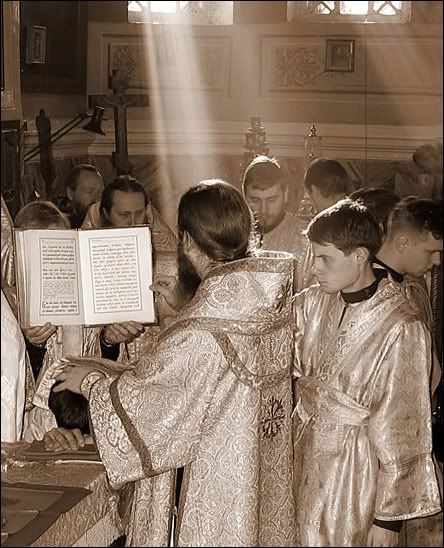
Sacraments (or Mysteries) are holy actions of the Church by which spiritual life is imparted to those receiving them. Ordination, which means "to set in place" or "to select by the outreached hand," is one of several Orthodox sacraments. It is extended specifically to bishops, presbyters (priests) and deacons, and generally to all through Holy Baptism.
Bishops
Deacons
Presbyters - Priests
OFFSITE: Sacrament of Ordination - Original article.
In His ministry Christ ordained or "set in place" the Twelve, assuring them, "You did not choose Me, but I chose you and appointed you that you should go and bear fruit, and that your fruit should remain" (John 15:16).
Both the New Testament and the Church Fathers recognise the Twelve as the first bishops or overseers in the Church. When Judas had fallen away and the disciples were considering his successor, Peter said, "Let another take his office" (Gr. Episkopen, lit. "Bishopric"; Acts 1:20). This bishopric was given to Matthias (Acts 1:26).
The apostles - these first bishops - in turn ordained presbyters and deacons.
The account of the first ordination of deacons (Acts 6:1-6) is quite detailed. "Seek out from among you seven men of good reputation, full of the Holy Spirit and wisdom," the apostles said, "whom we may appoint [Gr. Kathistemi, "to set down" or "ordain"] over this business" (Acts 6:3). The manner of this appointment is clear: "They laid hands on them" (Acts 6:6). The ordination of deacons in the Orthodox Church takes place in the same manner today, through the laying on of hands by the bishop.
The first account of the ordination of elders or presbyters is in Acts 14:23. The apostles Paul and Barnabas "appointed [lit. "Elected by stretching forth the hand"] elders in every church, and prayed with fasting," then "commended them to the Lord in whom they had believed." Similarly, Paul reminds his apostolic apprentice, Titus, "For this reason I left you in Crete, that you should set in order the things that are lacking, and appoint [set in place, ordain] elders in every city as I commanded you" (Titus 1:5).
The Titus passage brings to mind the first prayer the bishop prays over the one being ordained to the Orthodox priesthood; "Thy grace divine, which always heals that which is weak, and completes that which is lacking, elevates through the laying on of my hands this most devout deacon to be priest."
The bishop continues to ask God to "fill with the gift of the Holy Spirit this man ...that he may be worthy to stand in innocence before Your holy altar, to proclaim the gospel of Your Kingdom, to minister the word of Your truth, to offer You spiritual gifts and sacrifices, to renew Your people through the laver of regeneration."
A dramatic moment in the service of ordination comes when the candidate is led around the altar three times, kissing or venerating the four corners of the altar. This symbolises his marriage to Christ, his death with Christ, and his willingness to serve the Church sacrificially after the example of his Master.
Ordination is seen as an eternal appointment, "for the gifts and the calling of God are irrevocable" (Rom. 11:29). It is in this spirit that during each Divine Liturgy the priest prays for his bishop that "the Lord God remember him in His Kingdom always, now and ever, and unto ages of ages."
Through the sacrament of ordination in His Church, Christ entrusts to the shepherd the very salvation of His people's souls.
OFFSITE: Photography of Fr. Dionisy